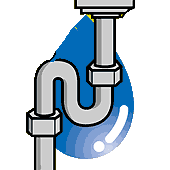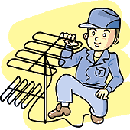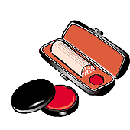
There are two common types of gas used in Japan. City gas, and liquefied petroleum gas (LP; i.e., propane gas). The type your apartment uses will depend on the area you live in.
Appliances may operate differently depending on the type of gas you fuel them with. Fires or other accidents may result if you use the wrong type of gas with the wrong type of appliance.
Before using any gas-powered appliance or machine, be sure to check with your landlord as to what type of gas your building is supplied with.
If you suspect a gas leak, extinguish all indoor fires,
stop using all gas-powered appliances, and turn off the gas valves in each room. (If LP gas is used, turn off the valves of gas cylinders・appliances)
Then open all your windows to ventilate the room. Immediately contact your gas provider*, and do not use the gas again until they have checked your building thuroughly.
* If you use Toshi gas (city/town gas), contact the gas company. If you use LP gas, contact the cylinder dealer. The contact number will most likely be written on the cylinder,
or the gas alarm.
To prevent fire in the event of a gas leak, please observe the following rules:
1.Do not pull the plug of the gas alarm.
2.Do not touch any outlets, or the switches of any electrical appliances
3.Do not turn off the ventilation fan.
LP gas is heavier than air and gathers close to the ground.
In the event of a leak, take extra precautions to protect small children and
pets, who are most likely to be down there.
Natural gas is supplied by a certian gas company throughout any given city.
Call the office of the company serving your city a few days before you move out, and tell them your customer number as indicated
on your gas bill/receipt, as well as you present address, name, new address,
and the day you will resume use of their services. A service person will
visit your residence on the appointed day, check the meter, and calculate
your bill.
(2)LP gas-Propane gas
Before you can use LP gas(propane gas), a safety inspection
is required. Ask the landlord whether your building has already been inspected. If not, be sure to contact your local LP provider. (The provider's name
and phone number should be written on the gas cylinder・gas meter.)
When you no longer need LP gas (because you are moving
or for any other reasons), contact your provider with the time and date you will discontinue use.
The dealer will then come to prepare the LP gas for discontinuance.
The price of gas is sometimes determined by the amount of gas you use. Sometimes there is a fixed rate. If your gas company charges by the amount of gas you use, they will inspect the meter every month to determine your bill.
You can pay your bill by automatic transfer through your
bank or postal account. The alternative is to pay cash at a (ガス会社名 ) Gas
service office, bank, post office, or convenience store.

When you move into your new accommodations, contact the
nearest service office of the Waterworks Bureau and inform them of your
name, address and the date you will need service from. (**Waterworks Bureau
Service Office TEL NO. )
Water charges for households include a water and a sewage
fee. Bills are sent to all households every other month.
Water meter readers come to read the meter every four months, leaving
slips informing the residents of the volume of water used each term.
You can pay the bill through the automatic payment system from your bank or postal account, or you can pay directly at a post office, convenience store, or Waterworks Bureau service office.
If you are moving out and wish to discontinue your water, notify the nearest Waterworks Bureau service office in advance.

(1)Starting service
(** )Electric Power Co., Inc. supplies power throughout the area. The frequency is ( )Hz, and the voltage is 100V.
When you move in to your new residence and begin to use
electricity, flip the breaker switch up.
A breaker is designed to shut off the supply of electricity
automatically when the flow of current exceeds the system's capacity.
(Usually, a breaker is located above a front door or around a bathroom.)
After confirming that electricity is working, fill in
the pertinent information on the postcard that should be attached to the
breaker or inserted in your mailbox.
If you cannot find the postcard, or the electricity is not working, call the(** )Center at TEL(* )(in Japanese).
Your electricity bill is determined by monthly meter
readings (checked by The electric co. personnel every month). You can pay
your bill by automatic transfer from your bank or postal account, or directly
at a financial institution, (** ) branch office, or convenience store.
The maximum amperage that can be used in your unit varies
depending on the housing complex. If you want to change the amperage,
consult your local office, and then apply to (** ) Electric Power Company.
Be sure to tell the landlord or agent about it in advance.
(4)Moving out
As soon as you have determined the day of your move, call the (** )Center and tell them your name, address,
the day you will move out, your new address, and your customer number (indicated
on your electric bill/power consumption notice.)
On the day you move, your meters will be checked, and you will be asked to pay for all electricity used up until that point.

You can apply for telephone service at your nearest NTT office. The costs amount
to \76,440 (\800 for the contract and \72,000 for installation, plus a
consumption tax of \3,650) (The price as of Dec.2000).You will be required
to show documents verifying your identity (your Alien Registration Certificate
or passport)
Dial TEL 116 for application and inquiries (in Japanese).
English information services are available through NTT Information (TEL
0120-364-463;toll free.)
If you have your own telephone, contact the telephone company
for installation procedures.
When opening an account you must first of all fill out
the "Application for Saving Account."form with the following
information:
Name, address, and the amount you will be depositing that day.
The counter labeled "ご新規go-shinki(New Accounts)" is the one where you can open a new account.
You will be asked to stamp a certain spot on the application with your Inkan(signet).
If you do not have an Inkan, the bank may accept your signature.
The following are required when opening a bank account:
a. ID (Certificate of Alien Registration or passport)
b. Your personal signet(Inkan) if you have one (not always required for foreign
residents).
Several kinds of IDs are acceptable for use when opening
an account. Driver's license, health insurance card, company
ID, school ID, Certificate of Seal, passport, or Certificate of Alien
Registration, are all fine. If the address stated on your driver's license is different
from your current address, or if you don't have driver's license, an additional document which proves
your current address will be required. For this, you can present your resident's card, or utility bill
or receipt (less than 3 months old ) with your current address.
When you open your savings account, you can also apply
for a cash card, which will allow you to use ATMs (Automatic Teller Machine).
You can pay utility bills such as water, gas, electricity,
and telephone, through the timesaving automatic payment system.
To apply for this system, bring your bankbook, the personal
seal with which you opened your account, and your previous month's paid
receipt for the bill you wish to have automatically paid from your bank.
Automatic payment will start one or two months after you
apply for automatic transfer.

Foreigners who will stay in Japan for more than 90 days are required to apply for Alien Registration.
Withing 30 days of arriving in Japan, you must go to the city government office where you live, and register the all information which the Alien
registration law stipulates. The Certificate of Alien Registration will
be issued based on this registration.
To register, you will need your passport and two copies of a passport-type photo taken within the past six months(The photos must
show a frontal view from the shoulders up with no hat). You must register
in person.There is no charge.
Applicants under 16 years of age do not need photos, and
they do not need to apply in person. A relative (who lives in the same household) may apply on their behalf.
Since a Certificate of Alien Registration (for those 16
years old and older) is a plastic card, it usually takes about 2 to 3
weeks after registration until the certificate is issued.

Ordinary mail placed in public mailboxes is collected daily by postmen.
Collection times are listed on the side of the mailbox.
When you send parcels, you can either take them to your post office, or telephone the post office to have them picked up.
You can send money by a postal money order or transfer
it into your recipient's postal account. You can also send cash by registered
mail, but only domestically.
A postal account can be used like a bank account. You
can deposit and withdraw money at any post office in the country,
and pay your public utility bills (gas,
water, electricity and telephone) by account transfer.

A personal seal is used in Japan for the same purposes as a signature is used in other countries. Seals include regular personal seals (used as a signature) and registered seals (used for important official documents).
If you expect to be signing any important financial documents during your stay in Japan, it is probably a good idea to obtain a personal seal(Hanko).

In Japan, one of your greatest worries may be "what do I do if I get sick?"Japanese doctors and hospitals are notoriously expensive . Visiting a doctor for a simple cold or flu is likely to cost you \5,000. If you are hospitalized for an appendicitis, it is likely to cost hundreds of thousands of yen. Because of these high prices, it is difficult for any individual to afford doctor fees on their own. To ensure that people can receive medical treatment without worry, everyone who lives in Japan is legally required to join one of the public health insurance plans.
All foreign residents, including students, must enroll in the National Health Insurance Program, if they are unemployed or not enrolled in a worker's health insurance program at their place of employment.
For more information, contact the Insurance Dept. of your
company, or the city government office where you live.